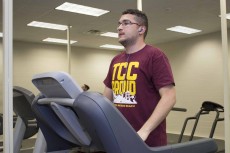By Jeremy Moore/ campus news editor
It’s easy for a college student to put on extra weight during a semester.

Bogdan Sierra Miranda/The Collegian
With school, work and many other responsibilities, maintaining a healthy lifestyle is often not as high on a student’s list of priorities as it should be.
Some students, like Jackie Reyes of SE, both work and go to school full time.
“I love eating healthy Mexican food, but I never have time to exercise,” she said. “Work and school always has me too busy.”
On the other hand, SE student Kameron Clay finds time to exercise four to five times a week.
“I have to work out as much as I can,” he said. “Working out gives me confidence, relieves stress, and it helps fight off sickness.”
Co-director of the Mayo Clinic Sports Medicine Center Edward R. Laskowski recommends healthy adults get at least 150 minutes a week of moderate aerobic activity or 75 minutes a week of vigorous aerobic activity. He also recommends strength training exercises be done twice a week for no specific amount of time. He suggests spreading out this activity during the course of a week.
Exercise is commonly known to benefit the body, but it also helps the brain. Osteopathic physician Joseph Mercola found exercise boosts brain growth and regeneration, prevents brain and muscle decay and shields from stress and depression.
Exercise also releases dopamine, which improves motivation, focus and learning. It also releases norepinephrine, which improves attention, perception and motivation.
Food is also a big factor in how the brain works. Ninety-five percent of the body’s serotonin is found in the gastrointestinal tract. Serotonin is a chemical messenger that helps regulate sleep and appetite and meditating mood.
Soda, potato chips, deli meats and many other processed foods can negatively affect a person’s mood.
SE student Anthony Bailey is aware of the effects that food can have on the brain, but at times, he has trouble eating healthy.
“I know what I should be eating, but it’s a lot easier to get fast food,” he said. “I try to eat healthy when I do eat fast food. If I go to Chick-fil-A, I try to get a salad.”
SE student Jessie Myers also knows the importance of eating healthy as well as getting the right amount of exercise.
“I get cardio exercise in three to four times a week,” she said. “I make sure I eat as many fruits as I can.”
Precision Nutrition coach Ryan Andrews offered students suggestions on how to keep a healthy diet.
One tip was to use their fists as a portion-size guide for whole grains, fruits and fats. He also believes students should focus on what they should eat rather than focusing on what they shouldn’t eat.
He suggested adding foods such as fruits and vegetables while staying away from processed foods.


























